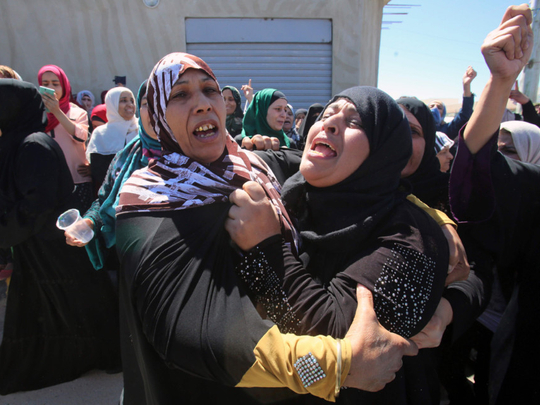
Ramallah: It was the bloodiest week since last October for Palestinians with over seven Palestinians shot and killed by Israeli troops since Thursday, Gassan Al Khatib, a political scientist at Beir Zeit University, said.
On Monday, Israeli occupation forces shot and killed a Palestinian and seriously wounded another at a military checkpoint near Al Ebrahimi Mosque in Hebron.
Israel says the two Palestinians attempted to stab the soldiers but none of the soldiers were hurt.
Shaikh Hifzi Abu Snainah, who heads Al Ebrahimi Mosque, said that before the attack, occupation forces had sealed off all the gates of the mosque and denied the Palestinians access to the holy site for prayers.
The two Palestinians had not yet been identified.
Israeli troops also shot and seriously wounded a Palestinian from Bab Al Amoud of Silwan of occupied East Jerusalem on Monday.
Sources in the holy city told Gulf News Ayman Hassan Al Kurd, 20, attacked two Israeli soldiers, including a woman soldier who suffered serious wounds.
Before the attack, Israeli soldiers sealed off the gates to Sultan Sulaiman Street in occupied east Jerusalem, forcing Palestinian traders to close their shops.
“Since Eid Al Adha, the situation in the West Bank and Jerusalem has deteriorated at an alarming rate and conditions are likely to worsen,” Al Khatib told Gulf News.
Palestinians say most of the Israeli shootings of Palestinians were unprovoked and part of an Israeli practice of extrajudicial killings.
Two weeks ago, the Palestinian Foreign Ministry asked the US to intervene after the recent spate of Israeli extrajudicial killings.
International legal and human rights organisations have documented Israel’s practice of extrajudicial executions, among other crimes, contrary to international law.
“Israeli defence minister Avigdor Liberman is using excessive force, collective punishments and extrajudicial killings to subdue the Palestinians,” Al Khatib added.
On Thursday, Israeli forces shot dead 30-year-old Mohammad Ahmad Abdul Fattah Al Saraheen, at point-blank range after claiming he resisted arrest in the town of Beit Oula near Hebron.
On Friday, Israeli forces shot at a Palestinian couple near the entrance of the Jewish colony of Kiryat Araba’a near Hebron. Fares Mousa Mohammad Khadour, 18, was killed on the spot and his fiancee, Raghad Abdullah Khadour, was critically injured. Israel claims the couple tried to ram their car into Jewish colonists.
Also on Friday, Israeli forces shot dead a Jordanian national at the Damascus Gate of occupied East Jerusalem.
Israeli forces claimed Saeed Amro, 28, attempted to stab an Israeli police officer, but Palestinians speaking to Gulf News say he was on his way to perform prayers at Al Aqsa Mosque.
His funeral was held in his hometown of Al Karak, Jordan on Monday.
On Saturday, Israeli soldiers shot dead Hatem Abdul Hafiz Al Shaloudi, 25, at the Tal Al Rumaida checkpoint near the city of Hebron.
Israel claimed Al Shaloudi attempted to stab an Israeli soldier at the checkpoint, but eyewitnesses who spoke to Gulf News contradicted the Israeli version.
Ayman Al Qadi, Al Shaloudi’s neighbour, said he was shot dead for no apparent reason while attempting to cross the checkpoint on his way to work.
The checkpoint is the only way out of Hebron after occupation forces have sealed all other exits to the city.
Several hundred Jewish colonists live in a tightly guarded enclave in the heart of the city of more than 200,000 Palestinians, a persistent source of tension.
Also, more than 35,000 Jewish colonists live in 25 colonies around the Hebron region, effectively suffocating its Palestinian residents. A few hours earlier, Israeli forces shot dead 15-year-old Mohammad Kayed Thalji Al Rajabi while he was crossing the same checkpoint.
“With extrajudicial killings go unpunished, Palestinian anger grows, adding fuel to the already raging fires,” Al Khatib said.
Some Palestinians youth have vented their anger and frustration by carrying out lone-wolf attacks against Israeli targets.
Al Khatib also cited the lack of faith and trust of Palestinians in their own political parties as another source of tension.
Palestinian municipal elections which were slated for October were called off by the Palestinian government.












